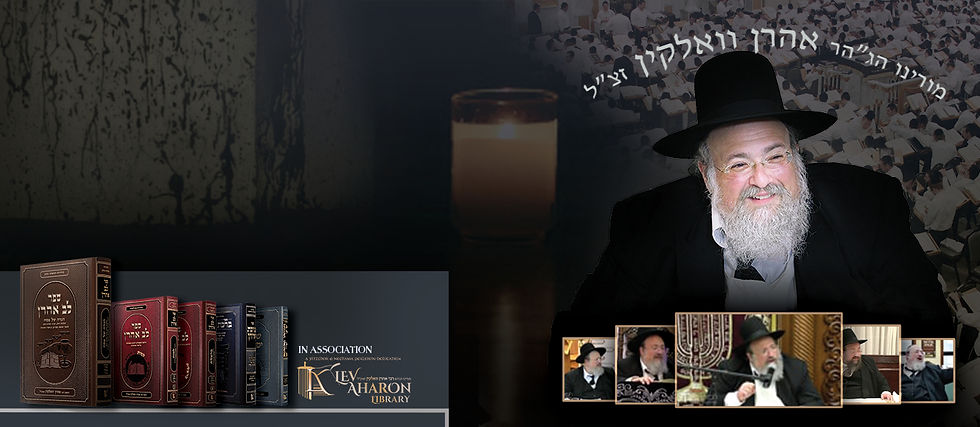Switching Din to Rachamim
- Shlomo Walkin
- Oct 11, 2024
- 3 min read
The Duality of Rosh Hashanah and Yom Kippur

Hashem created the world with the midas haRachamim (attribute of mercy)¹. The Thirteen Attributes of Mercy begin with the words “Kel Rachum v'chanun…”². Yes, Hashem is Kel—a God of judgment—but compassionate and gracious mercy. We merit His mercy by showing mercy to others, as it says: “Kol hamerachem al habriyos, merachem alav min hashamayim”—whoever has mercy on Hashem’s creations will receive mercy from Heaven³.
The Midrash teaches that when Bnei Yisrael blows the shofar, Hashem sits on His throne of mercy, filled with compassion, and He turns judgment into mercy⁴. This is Rosh Hashanah—Din b'Rachamim (judgment with mercy). In contrast, Yom Kippur is Rachamim BaDin (mercy within judgment)⁵. While on Rosh Hashanah, Hashem’s mercy transforms judgment, Yom Kippur is a day of complete mercy. It doesn’t need to be invoked; rather, it naturally comes with Yom Kippur. This can be seen in the words of mussaf Hayom Haras Olam "Im k'banim, rachmeinu k'rachem av al banim. V’im k'avadim…ad she’tichaneinu…”⁶— Rosh Hashanah is about "Melech," while Yom Kippur is about "Av" (father), and a father naturally has compassion for his child.
Whether as children, or as servants; if as children, have compassion on us as a father has compassion on his children! If as servants, our eyes are fixed on You until You favor us, and bring forth our judgment as the light, Revered and Holy One! (mussaf Rosh Hashanah)
There is a classic Gemara that parallels Yom Kippur: Hashem invites Rabbi Yishmael into His innermost chambers and says, “Yishmael my son, bless Me”⁸.
The avodah of Yom Kippur is lifnei u'lifnim—the innermost service. On this day, the Kohen Gadol is granted entry into the innermost chamber of Hashem—the Kodesh HaKodashim. Only Hashem’s children are allowed into His innermost chambers; even the angels are forbidden from entering the Kodesh HaKodashim¹⁰.
Our relationship with Hashem on Yom Kippur is unique. It is a time when all He wants from us is to arouse His compassion. Rabbi Yishmael understood this and blessed Hashem: “Sheyigolu rachamecha al ka’ascha”—may Your mercy take precedence over all other attributes¹¹. Just as a father refuses to believe a negative report about his child, on Yom Kippur, Hashem does not wish to see the faults of His nation. On Yom Kippur, He is only our Father.
How Can Hashem Be Dan L'kaf Z'chut?

In a discussion with Rav Reuven Feinstein shlit"a, he related to me a question that he once posed to his father, the great Rosh Yeshiva, Hagaon Rav Moshe Feinstein zt”l. He asked, how can we understand the concept that Hashem is dan l'kaf z'chut? As mere mortals, we do not know the full picture. When we see someone seemingly doing something wrong, we can assume that there may be reasons beyond our limited understanding. But the Ribono Shel Olam knows every minute detail of each person’s actions. How can we ask Him to judge us favorably?
One answer is that we are asking Hashem to look into the underlying reasons for our sins. Yes, we have wronged Him, but it is due to the pain and hardship we face. Were it not for the suffering and trials of this long exile, we would not have strayed so far. No one understands this better than Hashem. This is what we mean when we say that He is dan
l'kaf z'chut.
However, the Rosh Yeshiva, in his classic manner of simplicity and depth, answered: “Es is a gutte kasha, uber der Eibershter ken es tan.” It’s a good question, but Hashem can do it. The mercy of Hashem on His children on Yom Kippur doesn’t add up. But when it’s your child, it doesn’t have to. You can know that your child is completely wrong, and still, you will try to find him excuses. He is your child, after all.
Sources:
Midrash Rabbah on Bereishis 12:15
Shemos 34:6-7.
Talmud Bavli, Shabbat 151b.
Machzor for Yom Kippur, "Unesaneh Tokef".
Talmud Bavli, Berakhot 7a.
Talmud Yerushalmi, Yoma 5:2.
Talmud Bavli, Berakhot 7a.























Comments